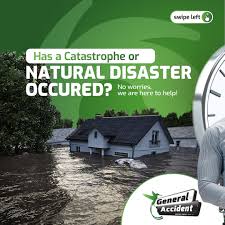
Will Your Insurance Protect You During a Natural Disaster?
Natural disasters—whether hurricanes, wildfires, floods, or earthquakes—can strike without warning and leave devastating damage in their wake. When disaster hits, many homeowners and renters turn to their insurance policies for relief. But the tough reality is: not all insurance policies cover natural disasters equally, and some may leave you exposed to major financial loss.
So, will your insurance really protect you when nature unleashes its fury? Let’s dive into what typical insurance covers, what it doesn’t, and how to prepare so you’re not caught off guard.
1. What Does Standard Homeowners Insurance Cover?
Most standard homeowners insurance policies protect against:
-
Fire damage (including wildfire)
-
Windstorms (in many cases, though some wind-related damages may be excluded)
-
Theft or vandalism
-
Liability for accidents on your property
However, many natural disasters like floods and earthquakes are typically excluded from standard coverage.
2. The Most Common Natural Disaster Coverage Gaps
a. Flood Damage
-
Flooding caused by heavy rain, river overflow, or storm surge is generally not covered.
-
You’ll likely need a separate flood insurance policy, often through the National Flood Insurance Program (NFIP).
b. Earthquake Damage
-
Earthquake coverage is usually an add-on or a separate policy.
-
Regions prone to earthquakes often require this extra coverage.
c. Hurricanes and Wind Damage
-
Wind damage is often covered, but some insurers exclude it or charge higher premiums in hurricane-prone areas.
-
Flooding from hurricanes usually isn’t covered unless you have flood insurance.
3. How to Know What Your Policy Covers
-
Review your policy documents carefully—look for exclusions related to natural disasters.
-
Contact your insurance agent to clarify what’s included and what isn’t.
-
Ask specifically about flood, earthquake, and windstorm coverage.
4. Steps to Make Sure You’re Protected
a. Purchase Separate Policies if Needed
-
Flood insurance via NFIP or private insurers.
-
Earthquake insurance if you live in a high-risk zone.
-
Additional riders for specific risks common in your area.
b. Document and Inventory Your Property
-
Take photos or videos of your home and belongings.
-
Keep receipts and records of valuable items.
-
This helps speed up claims and proves losses.
c. Prepare an Emergency Fund
-
Even with insurance, you may face deductibles or uncovered expenses.
-
Having savings set aside can ease the financial burden after a disaster.
5. Common Misconceptions
-
“My homeowner’s insurance covers all disaster damage.”
Usually false—most policies have exclusions for floods and earthquakes. -
“I don’t need flood insurance because I don’t live near water.”
Floods can happen anywhere due to heavy rains or burst pipes. Flood insurance is often a wise precaution regardless of location. -
“It’s too expensive to insure against natural disasters.”
The cost varies, and the potential financial risk without coverage can be much higher.
Final Thought
Natural disasters are unpredictable, but your insurance coverage doesn’t have to be.
Don’t wait for a storm to hit to discover gaps in your protection. Know your policy, get additional coverage where necessary, and prepare both financially and practically.
Because when it comes to surviving a natural disaster, being prepared with the right insurance can make all the difference between recovery and financial ruin.
